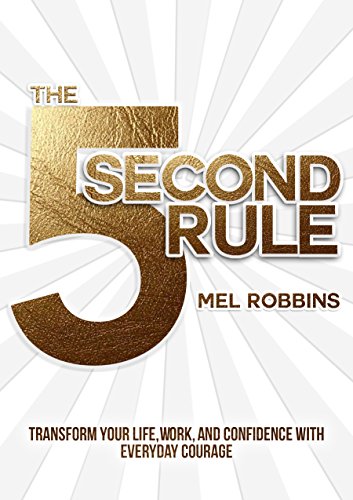For beginners, meditation may seem intimidating. There’s all this talk about Buddha, mindfulness, spirituality, connecting with the flow of the universe, and other profound buzzwords that give meditation a bad reputation.
Like Zen Master Hsing Yun says, “Meditation will not carry you to another world, but it will reveal the most profound and awesome dimensions of the world in which you already live. Calmly contemplating these dimensions and bringing them into the service of compassion and kindness is the right way to make rapid gains in meditation as well as in life.”
You can acquire the same peace, which doesn’t require fancy equipment or an expensive membership.
Today, we’re bringing you “How To Meditate For Beginners – A Definitive Guide.”

The 5 Second Rule
by Mel Robbins
⏱ 14 minutes reading time
🎧 Audio version available
In addition to finding meditation intimidating, beginners may also find sitting in silence odd or even disquieting. Sitting alone with your innermost thoughts and feelings as your playlist while you do nothing sounds unnerving. It’s okay to feel this way; everyone feels this way at first.
But if people have been doing this for the last 3,000 years, there’s got to be more merit to it than having a mental playthrough of all your current problems.
What if we told you that meditation will not only help you bring those thoughts to the front of your mind, but it will also help you make peace with them? Time and time again, mediation has proven to have a plethora of benefits that are backed by science.
It reduces stress, controls anxiety, promotes emotional health, helps with awareness, lengthens your attention span and focus, improves your quality of sleep, and even decreases your blood pressure. It makes you kinder and more grateful in your life, more focused, and even more attentive.
This is a decisive guide to help you through the steps of meditation, customized for beginners. After this video, why not give it a shot?
We’ll answer the most commonly asked questions and show you, in a short few steps, how to become a zen master!
When Should You Meditate?
When should you meditate is one of the most common questions.
For those new to the wonderful world of meditation, first thing in the morning is generally recommended. It’s easy to plan to meditate every day, but far more difficult to follow through and actually do it. To achieve consistency, set a reminder for every morning for right after when you wake up. For an extra reminder, put a physical note somewhere where you won’t miss it.
You have to make a commitment every day to turn this into a regular practice, even if you only do it a few times a week. The important thing is to be clear about how much time you’ll be dedicating to it. You might start with a two minute session and after a few sessions, expand to ten or fifteen minutes.
Here’s a suggestion! A lot of people have reported that they don’t meditate in the traditional lotus postion in a sunny studio way. Instead, they add it to a routine they already have, such as brushing their teeth in the morning, so they won’t forget.
How Long Should You Meditate?
After the initial two minute sessions to get you used to the stillness, you’ll want to expand the length of your sessions. It obviously depends on your lifestyle and schedule, but one of the most important parts about meditation is that frequency is more important than duration.
Give ten minutes a shot, then as you feel more comfortable with yourself, make the jump to 15 or 20 minutes. If it sounds overwhelming or daunting to sit in silence for that amount of time, cut it back. As you build your confidence and grow to love spending time with your mind and yourself, wanting to extend your sessions will come naturally.
What to Wear?
It goes without saying that meditation is a peaceful practice, and so it’s an activity that requires absolutely no frills. If crop tops and yoga pants don’t do it for you, don’t wear them! Wear whatever feels comfortable to you. That’s what’s so great about meditation. This is a freeing practice that only needs a few minutes of your day and the willingness to open your mind.
Now, let’s move on to the actual mediation.
Step One: Take a Seat
It’s as easy as that. Find somewhere that’s quiet and peaceful. A place that makes you feel calm. Let go of all the chatter about which cushions to use and where and how to sit.
You don’t even have to jump to the meditation and yoga mats right away. A lot of people actually find it more relaxing to sit on a chair or in bed or on the ground.
So start by sitting in whatever way is most comfortable to you. The important thing is that you’re comfortable, stable, and in a position that you can maintain for a while.
Step Two: Sit Still For 2 Minutes
As a beginner, it’s hard to believe that two minutes is all it takes to successfully meditate, but it’s true!
The next step, as you feel your heartbeat slowing down, your shoulders relaxing, and you start to realize that this is actually calming, start following your breath. Track your deep inhalation and exhalation. Feel the sensation of your breath as it fills you. Count each breath and follow them through your nose all the way to the bottom of your lungs.
As you breath in, count one, and then as you breathe out, count “two” and continue until the count reaches ten, then start over at one. As these two minutes pass, focus on your breathing techniques, focus on your belly expanding as you inhale and feel it contract as you exhale slowly.
Step Three: Follow Your Wandering Mind
Before you know it, your attention will shift from following your breath and begin to wander. This next step is noticing where it goes. This can take anywhere from a few seconds to a few minutes into your session. Allow it to wander and then recenter yourself in reality by returning your focus to your breathing.
Now, think about what happened. How long did it take before your mind started to wander away from your breath? Can you see how busy your mind is, even without you actively guiding it?
Oftentimes, without us even noticing it, our minds have these narratives that we don’t want. Incessant unanswerable questions about a conversation you had this morning or worries about bills, time management, and personal problems can dominate your thoughts. You may even start questioning why you’re meditating in the first place when you could be doing other things?
The thing is– meditation is just as productive as other activities. It has long-lasting benefits in your life.
Don’t judge yourself for the rampant thoughts that your mind throws your way. What’s important is that you come back from it, which leads us to our next step.
Check in With Yourself
Now that you’re coming back from the deep breathing and stillness, check in with how you’re feeling. How does your body feel? Does your mind still feel as chatter-filled as before? As busy and tired as before? Do you feel more at peace and relaxed?
Whatever your answer is, don’t fret that you’re doing it wrong. There comes a time when every meditation beginner wonders if they’re doing things wrong. We can assure you that you’re not– simple because there is no one single way to do it. Your happiness and well-being are the end goals here.
And don’t worry about the “clear your mind” bit. This is a common misconception about meditation. It’s not all clearing your mind and stopping your thoughts. While that can happen, it isn’t the goal of meditation. Your mind will inevitably wander and have thoughts, and you can’t shut them down.
Don’t hate the rising thoughts or try to stop the thoughts that do arise.
And at the end of the day, there is no such thing as good or bad mediation. It’s all about awareness. As Jon Kabat-Zinn put it, “Mindfulness practice means that we commit fully in each moment to be present; inviting ourselves to interface with this moment in full awareness, with the intention to embody as best we can an orientation of calmness, mindfulness, and equanimity right here and right now.”
What Is Snapreads?

With the Snapreads app, you get the key insights from the best nonfiction books in minutes, not hours or days. Our experts transform these books into quick, memorable, easy-to-understand insights you can read when you have the time or listen to them on the go.


